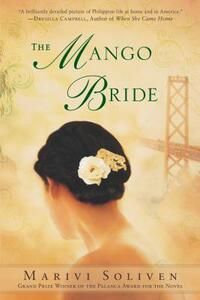Take a photo of a barcode or cover
Meeh. The writing is okay enough to make you want to finish the book even though you already know the ending.
Honestly, the writer is good. She has mastery over words that can help you "see" the characters in 3D. I felt like they were based on a true story (and they probably are.)
Plot wise? I didn't like it.
Honestly, the writer is good. She has mastery over words that can help you "see" the characters in 3D. I felt like they were based on a true story (and they probably are.)
Plot wise? I didn't like it.
I'm breaking this book through two parts: plot and structure.
PLOT:
Beverly and Amparo meet in California under circumstances that could be considered worthy of a Filipino soap opera, minus the abortion censors. Although all the convoluted relationships stayed within a circle of other relationships, such is the tight-knit clan of Duarte-Guerrero, it all still became quite cliche, within Filipino standards.
Men in this book are sinful, and I don't mean that in the sexy kind of way. Mateo, Fico, Aldo, Lydell, Josiah? Just, unnecessarily bad examples of bad people in life, be it white old veteran creeps or adulterers or heartless lovers. The only respectable men in this book are either in America (minus Josiah):Seamus, the Chess Manongs (as I like to call them), Aldo Guerrero (at some extent) or is Rodrigo Guerrero.
The women of the Guerrero house? Pretty much bitchy version 5.0. Concha and Lupita had no reason to be that bitchy, as far as I know, not a lot of spoiled people in this country are that bitchy, going so far as being so irrationally upset about high society and gossip.
Marcela is pretty much everyone's mother, and I like her for it but not enough to give this book another star, because the summary says that it's about Amparo and Beverly, but the outcome is literally about Marcela and her sister, Clara. Both Amparo and Bev made some pretty dumb decisions because of their ambitions, but they redeemed themselves. Well, Amparo did.
I also have a long-standing hatred for gay men portrayed as beauty queens in PH media
STRUCTURE:
This could have gone better with less anecdotes. It would have ended earlier, but that could have given the author time to actually plan the purpose of this book through and through. The anecdotes just stretched this out too much, and context clues were already given. It's the same way with the Filipino words in the story, but that's actually helpful. If you mention the event already, you can move on without further expanding on the event unless you need the event to portray something important.
The time line is really hard to follow too, considering that the prologue happens after the third to the last chapter of the book. So , yeah.
OVERALL:
It's an okay book because it's kind of educational on the side of history where mail-order brides were a thing, and traces of Filipino behavior immediately after Marcos. It's an okay book because it actually kept me going until I finished it. It's an okay book because maybe I just don't like adult novels but like the concept that this one gave me.
But it's just an okay book. It's not amazing or mind-blowing, or even at all that engaging. It's long-winded and just this side of cliche.
PLOT:
Beverly and Amparo meet in California under circumstances that could be considered worthy of a Filipino soap opera, minus the abortion censors. Although all the convoluted relationships stayed within a circle of other relationships, such is the tight-knit clan of Duarte-Guerrero, it all still became quite cliche, within Filipino standards.
Men in this book are sinful, and I don't mean that in the sexy kind of way. Mateo, Fico, Aldo, Lydell, Josiah? Just, unnecessarily bad examples of bad people in life, be it white old veteran creeps or adulterers or heartless lovers. The only respectable men in this book are either in America (minus Josiah):Seamus, the Chess Manongs (as I like to call them), Aldo Guerrero (at some extent) or is Rodrigo Guerrero.
The women of the Guerrero house? Pretty much bitchy version 5.0. Concha and Lupita had no reason to be that bitchy, as far as I know, not a lot of spoiled people in this country are that bitchy, going so far as being so irrationally upset about high society and gossip.
Marcela is pretty much everyone's mother, and I like her for it but not enough to give this book another star, because the summary says that it's about Amparo and Beverly, but the outcome is literally about Marcela and her sister, Clara. Both Amparo and Bev made some pretty dumb decisions because of their ambitions, but they redeemed themselves. Well, Amparo did.
STRUCTURE:
This could have gone better with less anecdotes. It would have ended earlier, but that could have given the author time to actually plan the purpose of this book through and through. The anecdotes just stretched this out too much, and context clues were already given. It's the same way with the Filipino words in the story, but that's actually helpful. If you mention the event already, you can move on without further expanding on the event unless you need the event to portray something important.
The time line is really hard to follow too, considering that the prologue happens after the third to the last chapter of the book. So , yeah.
OVERALL:
It's an okay book because it's kind of educational on the side of history where mail-order brides were a thing, and traces of Filipino behavior immediately after Marcos. It's an okay book because it actually kept me going until I finished it. It's an okay book because maybe I just don't like adult novels but like the concept that this one gave me.
But it's just an okay book. It's not amazing or mind-blowing, or even at all that engaging. It's long-winded and just this side of cliche.
dark
emotional
mysterious
sad
tense
medium-paced
Plot or Character Driven:
A mix
Strong character development:
Complicated
Loveable characters:
Complicated
Diverse cast of characters:
No
Flaws of characters a main focus:
No
challenging
dark
emotional
reflective
sad
medium-paced
Plot or Character Driven:
Plot
Strong character development:
Yes
Loveable characters:
No
Diverse cast of characters:
No
Flaws of characters a main focus:
Yes
Just came back from going home via this book. This is the Manila I have a love/hate relationship with. Apart from some "no, that's not the right word!" moments and (usually unnecessary) accent weirdness, it was perfect.
Found this one just shelf-surfing at the library. I really liked it. I've read so much fiction about the immigrant experience set in India and China, it was really interesting to read a novel where part of the story takes place in the Philippines and the rest is about Philippine immigrants in the US.
The story is about two women, seemingly unrelated although as the book continues their stories end up intertwining. One is the daughter of a high-class family in Manila, the other the niece of a housekeeper, also in Manila. Both women find themselves in Oakland, California, far away from home for different reasons.
Class played a very strong role in this book - particularly in Manila, the comparisons between the "haves" and "have-nots" was sharp. Both women were very likable and both made decisions that were mistakes as young women that had impact throughout their lives. I liked how the author switched between the two stories and through different time periods to weave the narratives together.
The story is about two women, seemingly unrelated although as the book continues their stories end up intertwining. One is the daughter of a high-class family in Manila, the other the niece of a housekeeper, also in Manila. Both women find themselves in Oakland, California, far away from home for different reasons.
Class played a very strong role in this book - particularly in Manila, the comparisons between the "haves" and "have-nots" was sharp. Both women were very likable and both made decisions that were mistakes as young women that had impact throughout their lives. I liked how the author switched between the two stories and through different time periods to weave the narratives together.
This novel won the Palanca Award in 2011 (under the title In the Service of Secrets), and was later picked up Penguin. A Filipino translation by Danton Remoto is also available--which I sort of wish is the one I picked up but I'll get back to that later.
The Mango Bride is primarily about two women; Amparo and Beverly and their different experiences leaving behind their own country and living in America. It's also about families, the need to keep up appearances, and the fickleness of fate.
It's not bad. There were moments when I found myself laughing at the sheer ridiculousness of the situation but also being fully aware that it can (and probably does) happen in real life. One of the most memorable scenes for me waswhen Dona Concha, bleeding from the wound on her breast, tells her son not to call for an ambulance for fear of scandal. Of course she would. There's something very Filipino about risking death just to keep the neighbours from gossiping, the whole idea of having to keep up appearances, that might sound completely over the top to a foreigner but is just par of course in this country. The mileage may vary of course, but it was certainly true for my family.
The shifts between present time and the past was done well; I never got confused about what was happening. The POV is omniscient, jumping from one character to another as it sees fit. Not my cuppa, but it's not irritating and doesn't take away from the narrative.
It was a bit of a hard read. Not so much the soap opera/telenovela tropes (I'm used to that), but more because of the painful exploration of diaspora. Amparo and Beverly are both living and adjusting to a different country of course, but there is Manong Del and his buddies--Filipino war veterans who don't receive pension from the U.S. government because of the rescission act of 1946 (something I didn't even know about until I read the novel) and there are the Filipino migrants that Amparo talks to for her translation work.
There are two scenes which stood out for me the most:
a) Manong Del getting rushed to the hospital after trying to run after a thief who stole the money he and his friends had pooled together to help another Filipino migrant who'd broken his hip. Amparo finds out that Manong Del and co. get nothing from the U.S. government even though they have fought in a war for the U.S. She asks him why not come back to the Philippines, and he tells her that he cannot have two homes. That he's chosen the U.S. as his home.
b) In direct contrast is a call Amparo receives re: a man who was walking around Golden Gate Park during Thanksgiving, lonely and broken after having been left by his wife. This man is more helpless than Manong Del, who has carved a niche for himself in a foreign country. But in the end there is simply one truth: if you're not rich like Amparo is, diaspora is so much more than melancholy and nostalgia for home, more than not knowing where you belong, more than having to get used to foreign customs and traditions. It's about loneliness and survival and no safety nets. Without money, you get fucked when you get fucked overseas.
So: it's good. Not easy to read personally. Was not a fan of people speaking in Filipino and then going back to translate the whole thing in English. Yes I understand she's writing for an international audience but surely there's a way to get past this. Maybe pull a Jessica Hagedorn and just leave it untranslated? The readers can live without understanding some hysterical person's screaming. The rest of the novel is in English, but the Filipino sentences? Filipino speakers can have those.
The Mango Bride is primarily about two women; Amparo and Beverly and their different experiences leaving behind their own country and living in America. It's also about families, the need to keep up appearances, and the fickleness of fate.
It's not bad. There were moments when I found myself laughing at the sheer ridiculousness of the situation but also being fully aware that it can (and probably does) happen in real life. One of the most memorable scenes for me was
The shifts between present time and the past was done well; I never got confused about what was happening. The POV is omniscient, jumping from one character to another as it sees fit. Not my cuppa, but it's not irritating and doesn't take away from the narrative.
It was a bit of a hard read. Not so much the soap opera/telenovela tropes (I'm used to that), but more because of the painful exploration of diaspora. Amparo and Beverly are both living and adjusting to a different country of course, but there is Manong Del and his buddies--Filipino war veterans who don't receive pension from the U.S. government because of the rescission act of 1946 (something I didn't even know about until I read the novel) and there are the Filipino migrants that Amparo talks to for her translation work.
There are two scenes which stood out for me the most:
b) In direct contrast is a call Amparo receives re: a man who was walking around Golden Gate Park during Thanksgiving, lonely and broken after having been left by his wife. This man is more helpless than Manong Del, who has carved a niche for himself in a foreign country. But in the end there is simply one truth: if you're not rich like Amparo is, diaspora is so much more than melancholy and nostalgia for home, more than not knowing where you belong, more than having to get used to foreign customs and traditions. It's about loneliness and survival and no safety nets. Without money, you get fucked when you get fucked overseas.
So: it's good. Not easy to read personally. Was not a fan of people speaking in Filipino and then going back to translate the whole thing in English. Yes I understand she's writing for an international audience but surely there's a way to get past this. Maybe pull a Jessica Hagedorn and just leave it untranslated? The readers can live without understanding some hysterical person's screaming. The rest of the novel is in English, but the Filipino sentences? Filipino speakers can have those.






